In a show of bipartisan support, two bills aimed at improving the care and services for police K-9s were signed into law on Thursday, August 10, 2023.
Senate Bill 117, along with Senate Amendment 1, was championed by Senator Brian Pettyjohn of Georgetown. The legislation brings a change to the way injured police dogs are treated during emergency situations. Under the new law, paramedics and other emergency medical service (EMS) providers are authorized to administer immediate care and transportation to police K-9s injured at the scene of an emergency. This proactive measure ensures that these loyal and brave animals receive the timely medical attention they deserve, potentially saving lives in the process.
Furthermore, Senate Bill 117 provides an essential layer of protection for EMS personnel who lend their assistance in good faith. These dedicated individuals will now enjoy civil immunity, shielding them from legal liabilities if their efforts to aid a police dog in distress were genuine and well-intentioned. Senator Pettyjohn emphasized the importance of acknowledging the integral role that police K-9s play in law enforcement activities, stating, “Police K-9s are an integral part of our law enforcement community… We must do all we can to provide the best level of care to not only the men and women in blue, but also to the police dogs that are often called to rush directly into danger.”
The second bill, Senate Bill 176, sponsored by Senator Dave Lawson of Marydel, addresses the welfare of retired law enforcement canines. These faithful partners, who have dedicated their lives to serving and protecting their communities, deserve continued care even after their active duty days are over. The legislation requires the owners of retired law enforcement canines to be reimbursed up to $1,500 annually for veterinary care expenses. This financial support not only acknowledges the sacrifices these animals have made but also eases the burden on individuals and families who provide post-retirement care for these exceptional canines.
Senator Lawson, drawing on his experience as a former Delaware State Trooper, expressed his appreciation for the bravery exhibited by police K-9 units, stating, “It’s a tough and grueling job, and these canines require the best veterinary care post-retirement. I thank those who take in these retired police dogs, and this new law will help provide financial relief to the individuals and families who care for these amazing canines.”
Both Senate Bill 117 and Senate Bill 176 received unanimous approval from the General Assembly, showcasing the broad consensus on the importance of these legislative changes. The bills’ passage signifies a significant step forward in acknowledging the contributions of police K-9s to law enforcement and their communities. With these laws in place, Delaware sets an inspiring example of how bipartisan efforts can come together to ensure that these four-legged heroes receive the respect, care, and support they truly deserve.

